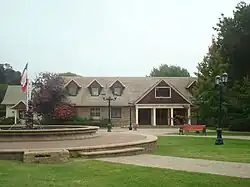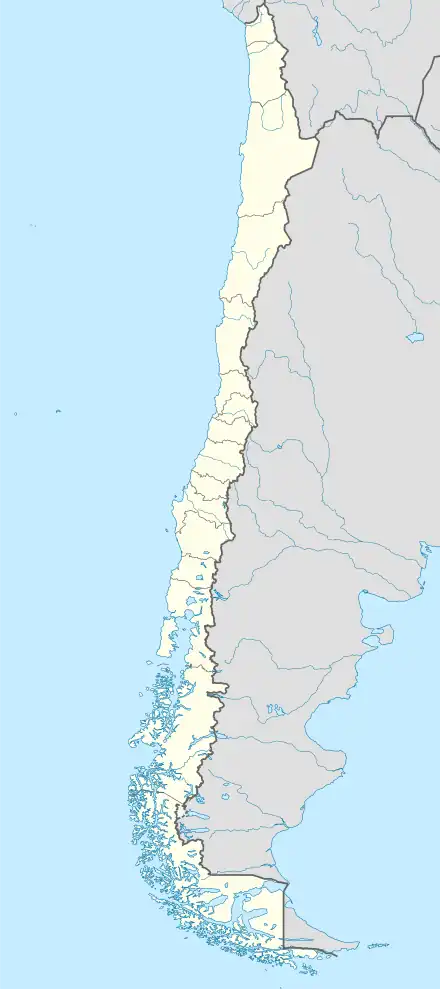Santo Domingo | |
|---|---|
 Municipalidad Santo Domingo | |
|
  Santo Domingo Location in Chile | |
| Coordinates (city): 33°38′09″S 71°37′41″W / 33.63583°S 71.62806°W | |
| Country | Chile |
| Region | Valparaíso |
| Province | San Antonio Province |
| Government | |
| • Type | Municipality |
| • Alcalde | Fernando Rodríguez Larraín |
| Area | |
| • Total | 536.1 km2 (207.0 sq mi) |
| Elevation | 66 m (217 ft) |
| Population (2012 Census)[2] | |
| • Total | 8,860 |
| • Density | 17/km2 (43/sq mi) |
| • Urban | 4,737 |
| • Rural | 2,681 |
| Sex | |
| • Men | 3,811 |
| • Women | 3,607 |
| Time zone | UTC-4 (CLT[3]) |
| • Summer (DST) | UTC-3 (CLST[4]) |
| Area code | (+56) 35 |
| Website | Municipality of Santo Domingo |
Santo Domingo is a Chilean coastal city and commune in San Antonio Province, Valparaíso Region. It was founded as Rocas de Santo Domingo (St. Dominic's Rocks).
Demographics
According to the 2002 census of the National Statistics Institute, Santo Domingo spans an area of 536.1 km2 (207 sq mi) and has 7,418 inhabitants (3,811 men and 3,607 women). Of these, 4,737 (63.9%) lived in urban areas and 2,681 (36.1%) in rural areas. The population grew by 19.3% (1,200 persons) between the 1992 and 2002 censuses.[2]
Administration
As a commune, Santo Domingo is a third-level administrative division of Chile administered by a municipal council, headed by an alcalde who is directly elected every four years. The 2008-2012 alcalde was Fernando Rodríguez Larraín.[1]
Within the electoral divisions of Chile, Santo Domingo is represented in the Chamber of Deputies by María José Hoffmann (UDI) and Víctor Torres (PDC) as part of the 15th electoral district, (together with San Antonio, Cartagena, El Tabo, El Quisco, Algarrobo and Casablanca). The commune is represented in the Senate by Francisco Chahuán Chahuán (RN) and Ricardo Lagos Weber (PPD) as part of the 6th senatorial constituency (Valparaíso-Coast).
See also
References
- 1 2 "Municipality of Santo Domingo" (in Spanish). Retrieved 21 November 2010.
- 1 2 3 4 "National Statistics Institute" (in Spanish). Retrieved 21 November 2010.
- ↑ "Chile Time". WorldTimeZones.org. Archived from the original on 2007-09-11. Retrieved 2010-07-28.
- ↑ "Chile Summer Time". WorldTimeZones.org. Archived from the original on 2007-09-11. Retrieved 2010-07-28.
External links
- (in Spanish) Municipality site
